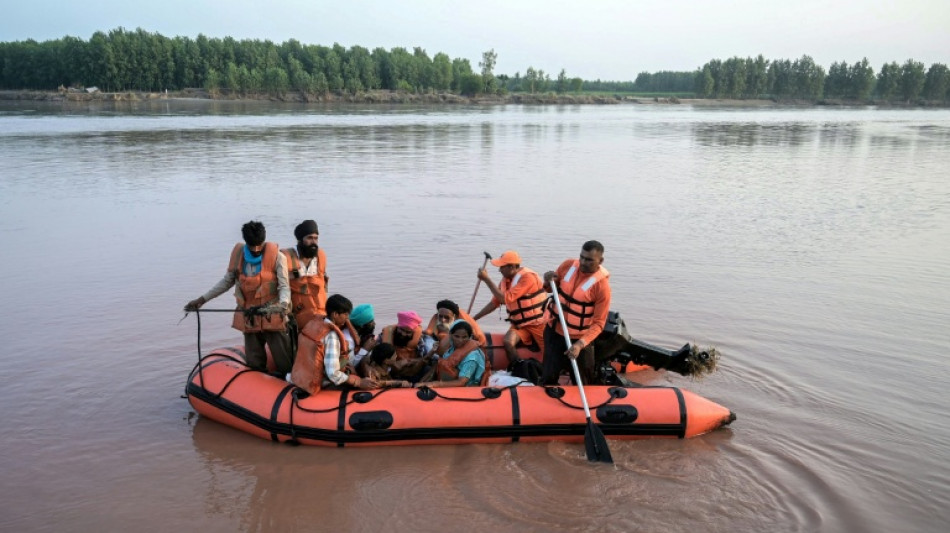
-
 Schenk wins windy Bermuda Championship for first PGA title
Schenk wins windy Bermuda Championship for first PGA title
-
Crime, immigration dominate as Chile votes for president

-
 Kane double gives England record-setting finish on road to World Cup
Kane double gives England record-setting finish on road to World Cup
-
World champions South Africa add Mbonambi, Mchunu to squad

-
 Greenpeace says French uranium being sent to Russia
Greenpeace says French uranium being sent to Russia
-
'Now You See Me' sequel steals N. American box office win

-
 Argentina beat Scotland after frenzied fightback
Argentina beat Scotland after frenzied fightback
-
Argentina beat Scotland after stunning fightback

-
 Pope urges leaders not to leave poor behind
Pope urges leaders not to leave poor behind
-
Pressure will boost Germany in 'knockout' Slovakia clash, says Nagelsmann

-
 Ecuador votes on hosting foreign bases as Noboa eyes more powers
Ecuador votes on hosting foreign bases as Noboa eyes more powers
-
Portugal qualify for 2026 World Cup by thrashing Armenia

-
 Greece to supply winter gas to war battered Ukraine
Greece to supply winter gas to war battered Ukraine
-
India and Pakistan blind women show spirit of cricket with handshakes

-
 Ukraine signs deal with Greece for winter deliveries of US gas
Ukraine signs deal with Greece for winter deliveries of US gas
-
George glad England backed-up haka response with New Zealand win

-
 McIlroy loses playoff but clinches seventh Race to Dubai title
McIlroy loses playoff but clinches seventh Race to Dubai title
-
Ecuador votes on reforms as Noboa eyes anti-crime ramp-up

-
 Chileans vote in elections dominated by crime, immigration
Chileans vote in elections dominated by crime, immigration
-
Turkey seeks to host next COP as co-presidency plans falter

-
 Bezzecchi claims Valencia MotoGP victory in season-ender
Bezzecchi claims Valencia MotoGP victory in season-ender
-
Wasim leads as Pakistan dismiss Sri Lanka for 211 in third ODI

-
 Serbia avoiding 'confiscation' of Russian shares in oil firm NIS
Serbia avoiding 'confiscation' of Russian shares in oil firm NIS
-
Coach Gambhir questions 'technique and temperament' of Indian batters

-
 Braathen wins Levi slalom for first Brazilian World Cup victory
Braathen wins Levi slalom for first Brazilian World Cup victory
-
Rory McIlroy wins seventh Race to Dubai title

-
 Samsung plans $310 bn investment to power AI expansion
Samsung plans $310 bn investment to power AI expansion
-
Harmer stars as South Africa stun India in low-scoring Test

-
 Mitchell ton steers New Zealand to seven-run win in first Windies ODI
Mitchell ton steers New Zealand to seven-run win in first Windies ODI
-
Harmer stars as South Africa bowl out India for 93 to win Test

-
 China authorities approve arrest of ex-abbot of Shaolin Temple
China authorities approve arrest of ex-abbot of Shaolin Temple
-
Clashes erupt in Mexico City anti-crime protests, injuring 120

-
 India, without Gill, 10-2 at lunch chasing 124 to beat S.Africa
India, without Gill, 10-2 at lunch chasing 124 to beat S.Africa
-
Bavuma fifty makes India chase 124 in first Test

-
 Mitchell ton lifts New Zealand to 269-7 in first Windies ODI
Mitchell ton lifts New Zealand to 269-7 in first Windies ODI
-
Ex-abbot of China's Shaolin Temple arrested for embezzlement

-
 Doncic scores 41 to propel Lakers to NBA win over Bucks
Doncic scores 41 to propel Lakers to NBA win over Bucks
-
Colombia beats New Zealand 2-1 in friendly clash

-
 France's Aymoz wins Skate America men's gold as Tomono falters
France's Aymoz wins Skate America men's gold as Tomono falters
-
Gambling ads target Indonesian Meta users despite ban

-
 Joe Root: England great chases elusive century in Australia
Joe Root: England great chases elusive century in Australia
-
England's Archer in 'happy place', Wood 'full of energy' ahead of Ashes

-
 Luxury houses eye India, but barriers remain
Luxury houses eye India, but barriers remain
-
Budget coffee start-up leaves bitter taste in Berlin

-
 Reyna, Balogun on target for USA in 2-1 win over Paraguay
Reyna, Balogun on target for USA in 2-1 win over Paraguay
-
Japa's Miura and Kihara capture Skate America pairs gold

-
 Who can qualify for 2026 World Cup in final round of European qualifiers
Who can qualify for 2026 World Cup in final round of European qualifiers
-
UK to cut protections for refugees under asylum 'overhaul'

-
 England's Tuchel plays down records before final World Cup qualifier
England's Tuchel plays down records before final World Cup qualifier
-
Depoortere double helps France hold off spirited Fiji


Floods devastate India's breadbasket of Punjab
The fields are full but the paddy brown and wilted, and the air thick with the stench of rotting crops and livestock -- the aftermath of record monsoon rains that have devastated India's breadbasket.
In Punjab, often dubbed the country's granary, the damage is unprecedented: floods have swallowed farmlands almost the size of London and New York City combined.
India's agriculture minister said in a recent visit to the state that "the crops have been destroyed and ruined", and Punjab's chief minister called the deluge "one of the worst flood disasters in decades".
Old-timers agree.
"The last time we saw such an all-consuming flood was in 1988," said 70-year-old Balkar Singh in the village of Shehzada, 30 kilometres (19 miles) north of the holy Sikh city of Amritsar.
The gushing waters have reduced Singh's paddy field to marshland and opened ominous cracks in the walls of his house.
Floods and landslides are common during the June-September monsoon season on the subcontinent, but experts say climate change, coupled with poorly planned development, is increasing their frequency, severity and impact.
Punjab saw rainfall surge by almost two-thirds compared with the average rate for August, according to the national weather department, killing at least 52 people and affecting over 400,000.
Prime Minister Narendra Modi has announced a relief package worth around $180 million for Punjab.
- '10 feet high' -
The village of Toor, sandwiched between the Ravi river and Pakistan, is in tatters -- strewn with collapsing crops, livestock carcasses and destroyed homes.
"The water came past midnight on August 26," said farm worker Surjan Lal. "It rose up to at least 10 feet (three metres) in a matter of minutes."
Lal said the village in Punjab's worst-affected Gurdaspur district was marooned for nearly a week.
"We were all on rooftops," he said. "We could do nothing as the water carried away everything from our animals and beds."
In adjacent Lassia, the last Indian village before the frontier, farmer Rakesh Kumar counted his losses.
"In addition to the land I own, I had taken some more on lease this year," said the 37-year-old. "All my investment has just gone down the drain."
To make things worse, Kumar said, the future looked bleak.
He said he feared his fields would not be ready in time to sow wheat, the winter crop of choice in Punjab.
"All the muck has to first dry up and only then can the big machines clear up the silt," he said.
Even at the best of times, bringing heavy earth-movers into the area is a tall order, as a pontoon bridge connecting it to the mainland only operates in the lean months.
For landless labourers like 50-year-old Mandeep Kaur, the uncertainty is even greater.
Her house was washed away by the water, forcing her to sleep in the courtyard under a tarpaulin sheet -- an arrangement fraught with danger as snakes slither all over the damp land.
- Basmati blues -
Punjab is the largest supplier of rice and wheat to India's food security programme, which provides subsidised grain to more than 800 million people.
Analysts say this year's losses are unlikely to threaten domestic supplies thanks to large buffer stocks, but exports of premium basmati rice are expected to suffer.
"The main effect will be on basmati rice production, prices and exports because of lower output in Indian and Pakistan Punjab," said Avinash Kishore of the International Food Policy Research Institute in New Delhi.
Punishing US tariffs have already made Indian basmati less competitive, and the floods risk worsening that squeeze.
The road to recovery for Punjab's embattled farmers, analysts say, will be particularly steep because the state opted out of the federal government's insurance scheme, citing high costs and a low-risk profile because of its robust irrigation network.
Singh, the septuagenarian farmer, said the water on his farm was "still knee-deep".
"I don't know what the future holds for us," he said.
H.Darwish--SF-PST



